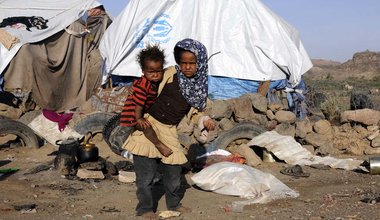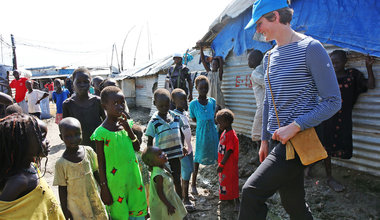UN calls for protection of civilians as Iraq begins military operations to retake Mosul
 As a large-scale military offensive gets under way to retake the Iraqi city of Mosul from Islamic State of Iraq and the Levant (ISIL/Da'esh) fighters, senior United Nations officials today are stressing the need to ensure that civilians in the city are protected and able to access to humanitarian assistance.
As a large-scale military offensive gets under way to retake the Iraqi city of Mosul from Islamic State of Iraq and the Levant (ISIL/Da'esh) fighters, senior United Nations officials today are stressing the need to ensure that civilians in the city are protected and able to access to humanitarian assistance.
“Families are at extreme risk of being caught in cross-fire or targeted by snipers. Tens of thousands of Iraqi girls, boys, women and men may be under siege or held as human shields,” UN Emergency Relief Coordination Stephen O’Brien said in a statement late yesterday.
“As many as one million people may be forced to flee their homes in a worst-case scenario,” he added.
Underscoring that nothing is more important than ensuring the protection of civilians and their access to assistance, he also called on all parties to the conflict to uphold their obligations under international humanitarian law and to ensure the protection of civilians.
In particular, he emphasized that children, women, the elderly and disabled will be specifically vulnerable.
Mr. O’Brien, who is also the head of the UN Office for the Coordination of Humanitarian Affairs (OCHA), further highlighted that humanitarian actors will be doing “everything possible” to support the people who may be affected by the military operation.
According to the statement, shelter is currently available for 60,000 people in camps and emergency sites and construction of additional sites, with capacity for 250,000 people, is underway.
Further, food rations for 220,000 families are ready for distribution, 143,000 sets of emergency household items are in stock, and latrines and showers are being readied for dispatch and 240 tonnes of medication are available at distribution points.
The statement also noted however, that despite generous contributions from donor countries, funding has been insufficient to prepare fully for the worst-case scenario.
In related news, UN High Commissioner for Refugees Filippo Grandi, presently on a four-day mission in Iraq, stressed that protection of civilians should be the most important element of the military operation.
Recalling the assurances he received from the Iraqi Prime Minister Haider Al-Abadi and the Government that civilian protection would be part of their military strategy, Mr. Grandi said that the safety of civilians “will be indispensable for the future of Iraq, for a future in which the people of Iraq can live together and build a prosperous country.”
He added that security screening of those fleeing the city should be conducted “in the most appropriate manner” and preferably overseen with UN monitors.
UNHCR said the assault on Mosul comes as the number of people displaced by war in Iraq has reached 3.3 million, or nearly one-tenth of the population. With hundreds of thousands of people likely to need assistance with shelter and other basic services, Mr. Grandi stressed that security screening of those fleeing the city should be conducted “in the most appropriate manner” – preferably overseen with UN monitors.
 UN
UN








